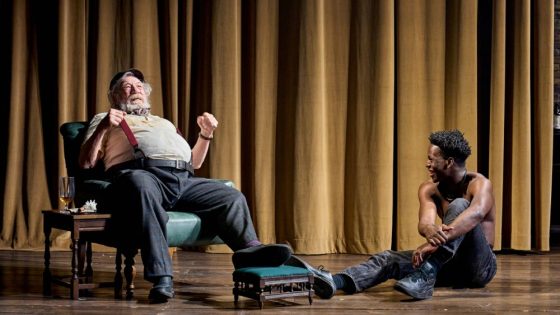According to theater lore, it was Elizabeth I who demanded Shakespeare write another play about Falstaff, which, allegedly, is why he wrote “The Merry Wives of Windsor.” The Queen might have been somewhat less keen for more had she lived another few centuries and discovered him via Robert Icke’s joint version of the two original Falstaff plays that make up the two parts of “Henry IV.” Ian McKellen’s dominant performance is predictably mesmerizing but it’s a long way from the traditional endearing rascal. Both the interpretation and Icke’s intelligent, austere production are, for the most part, strikingly sour.
The greatness of Shakespeare’s two plays – here crisply cut down and played together over one evening — is that neither is a comedy or a tragedy: They are, gloriously, both. Or, at least, should be.
Although, as the title suggests, they cover the reign of Tudor monarch Henry IV, they are really a giant, vivid canvas of Tudor lives, high and (very) low, at a time when the country was literally at war with itself. Straddling both of those classes is Henry’s son, Prince Hal (Toheeb Jimoh of “Ted Lasso”) who, at the end of the play succeeds his father to the throne. And at that point, he casts off not only his life of gleeful debauchery but the man who helped him misspend his youth, Falstaff.
Thundering drum’n’bass crashes in to set up a dark and dangerous sex party complete with someone in collar and leash being dragged across the stage and Hal’s dancing bareass. It defiantly sets up that this is a contemporary take on the drinking and whoring that is routine at the Boar’s Head Tavern in London’s Eastcheap. But visceral though the image is, like much of the production it not only risks overstatement, it robs the milieu of any warmth, thus jeopardizing audience engagement.
Presiding over all this, white-haired, scornful and more than usually vicious, is McKellen’s self-serving, nakedly villainous Falstaff. He’s heavily padded but McKellen takes that and runs with it: He embodies a decaying swagger, a sweating, corpulent record of a life dedicated to indulgence at the expense — and cost — of others. Arguably the greatest classical actor of his generation, McKellen’s command of the stage, of language and also, crucially, of silence hold the audience rapt, especially in gleefully self-aggrandizing soliloquies. Just as Falstaff does with anyone within his character’s orbit, McKellen winningly winds the audience around his little finger, presenting a man now wheedling, now roaring, always to his own advantage.
What he doesn’t always manage is to lose himself within the relationships of the play. This is because the fabric of the surrounding production lacks texture.
Invigorating though it is that Icke takes nothing in the play for granted, in this production (unlike in his hugely successful, compellingly rethought “Hamlet” with Andrew Scott), not enough coalesces into a complete vision, particularly in the slacker second half. It’s as if he’s heavily underlining his ideas about the nation, war, self-interest and so on, but failing to weave them into the text to allow audiences to think and respond. Arresting though it is to portray Hal as a coward stabbing his chief rival Hotspur in the back, it feels more like a loud imposition than an interpretation.
These qualities are also evident in the weak handling of the bucolic Gloucestershire scenes with elderly Shallow and Silence. Lee Curran’s lighting, which has moved between chilly Eastcheap, the crepuscular court and blood-red-drenched battle, suddenly switches to a bright warm glow, as if to say: here lies comedy. But although the change of pace and tone is welcome, cutting Falstaff’s gathering of men from those scenes means that the undertow vanishes and all that’s left is mild laughter.
Richard Coyle’s Henry has gravitas, thanks partly to Annette McLaughlin crisp, understated support as Warwick, his chief-of-staff. His stern court scenes are staged with simple effectiveness on Hildegard Bechtler’s cunning, multiple, brick-wall sets which are flown in and out to create different worlds. But, again, in the final showdown with him and his son, having Coyle leap desperately from his deathbed for their confrontation feels more gestural than a moment of genuinely earned dramatic truth.
On the very considerable plus side, the production’s other great bonus is Jimoh. Following his recent, exciting Romeo for Rebecca Frecknall, as Hal he again channels an almost preternatural sense of calm that draws audiences towards him. And when he smiles, it’s as if he’s revealing secrets to us. And, like McKellen, his handling of verse is wonderfully easeful.
The surprise, therefore, is that his climatic rejection of Falstaff doesn’t land emotionally. Icke has so overstated the necessary bitterness of state that the moment seems necessary rather than emotionally devastating.
The chance to see two actors of this caliber at the top of their game will, rightly, sell tickets and win hearts. The response generated by the production, however, is less emotional, more cerebral.
Source Agencies



